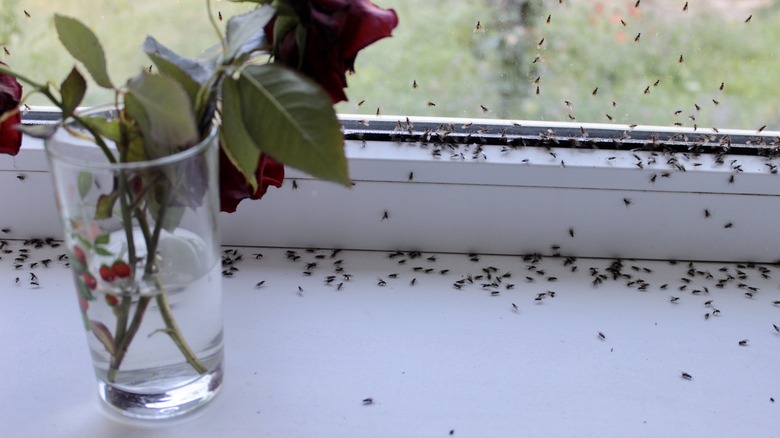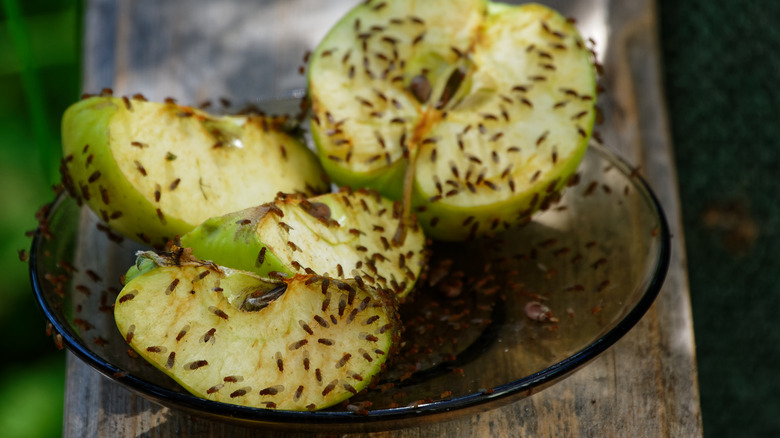Phorid Flies Vs Fruit Flies: Which Are Worse & Tips To Get Rid Of Them
Buzz, buzz — do you hear that? It's not your cellphone ringing, but little brown flies invading. You might find these critters in the kitchen near your produce or in the bathroom under the sink. It turns out there are two different types of these tiny bugs: phorid flies and fruit flies. One can be a sign of serious plumbing issues, while the other just signals spoiled food. For more insight into the differences and how to get rid of the flies, we spoke to Dr. Jim Fredericks, a board-certified entomologist and the senior vice president of public affairs at the National Pest Management Association (NPMA), in an exclusive House Digest interview.
"Phorid flies can sometimes be an indication that a sewer line has broken and is leaking organic matter," he said. "On the other hand, fruit flies typically mean you have some overripe fruit on the counter, so some may consider a phorid fly infestation worse." Neither are welcome in our house. Dr. Fredericks shared how to tell these insects apart and, better yet, how to get rid of them, prevent them from returning, and when to call in the pros.
The difference between phorid and fruit flies
Both types of flies are small and dark-colored, but there are a few key differences. "Adult fruit flies are typically brown or tan and 3 to 4 millimeters long," Dr. Jim Fredericks exclusively told House Digest. "They usually have red eyes with a tan thorax and black/grey abdomen." Typically, you'll see these pests buzzing around your overripe produce or rotting fruit, hence their name. "You may also find them near trash cans, drains, or garbage disposals, especially if food particles have accumulated there," the entomologist said. Fruit flies have the ability to sense fermenting matter and food, which lures them inside your home.
On the other hand, "Phorid flies look similar to fruit flies, but they don't have red eyes, and they're often seen running rather than flying," Dr. Fredericks said. While these critters like decomposing items, rotting fruit isn't their preferred choice. "Phorid flies feed on decaying organic matter and will often be found around floor drains that are in need of deep cleaning," he said. You'll spot them near pipes or sewer lines. They can be a sign of costly damage and be harder to get rid of. So, if you're wondering why fruit flies are buzzing around in your bathroom, take a second look; they might be phorid flies instead. However, regardless of which flying critter it is, you don't want them in your home. "Both of these flies are capable of spreading germs that can cause foodborne illness," Dr. Fredericks added.
How to get rid of phorid and fruit flies
Luckily, getting rid of these insects isn't too difficult, and Dr. Fredericks gave us a few expert tips on the best ways. "Once phorid flies have been identified, eliminating the decaying organic matter that is being used as a food source is essential," Dr. Jim Fredericks exclusively told House Digest. "This may mean manually scrubbing drains, or in some cases, a pest control pro may recommend a plumber to diagnose or repair broken or leaky sewer drain pipes." You want to get rid of what's attracting the phorid flies. They won't leave the buffet if you keep bringing dessert out. When the food source is eliminated, the flies will find elsewhere to feast.
The same rules apply to fruit flies. Dr. Fredericks said, "A major step in avoiding fruit flies is the elimination of their feeding and breeding grounds. If you identify a fruit fly infestation in your kitchen, dispose of all over-ripe or decaying fruit and produce." In other words, if you're not actually going to make banana nut bread, then toss those black bananas. Better yet, add them to your compost bin or use the food scraps to fertilize your garden. Blocking the insects' access to your home is also a great preventative step. Consider sealing any openings near doors and windows, so even if the flies are lured to your residence, they can't come in. However, if you're constantly facing the threat of phorid flies and fruit flies, then it's probably time to call in the professionals.


